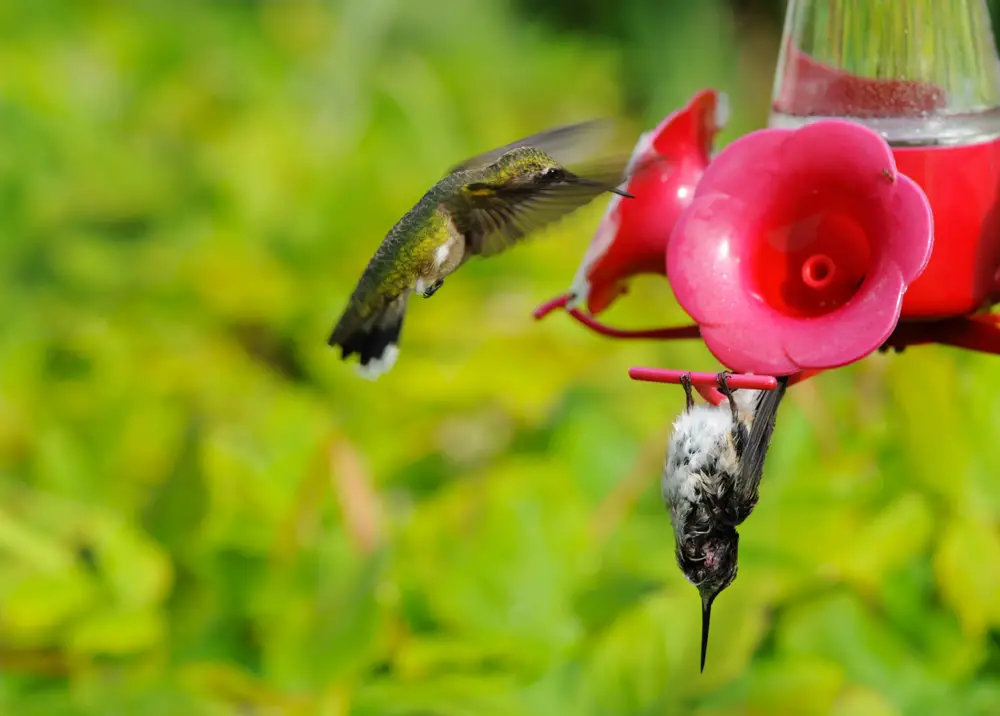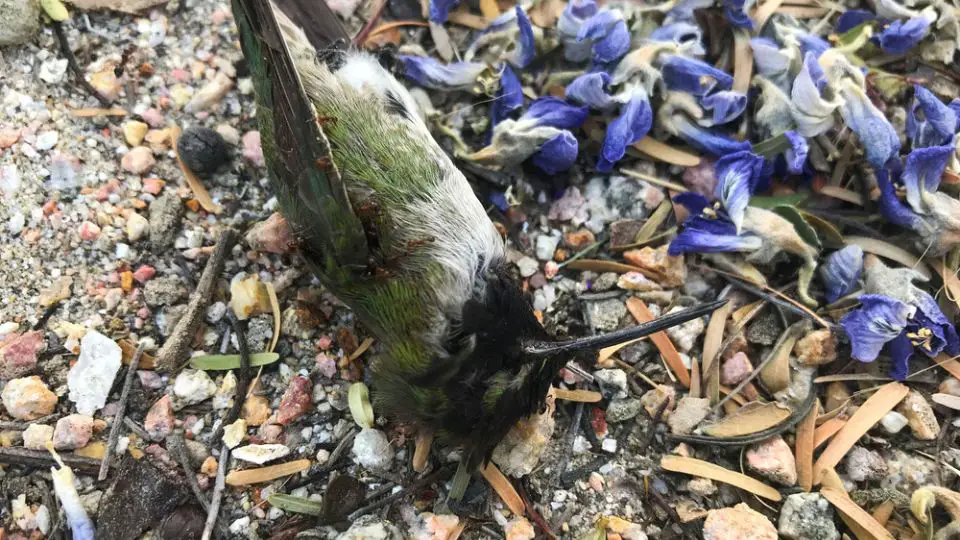If you happen to comes across a lifeless or motionless hummingbird, it is essential to confirm that the bird is in fact dead. Wait 30 min to an hour, if the hummingbird does not respond and come out of its slow metabolic survival mechanism—it may be dead. Follow the guidelines for disposal below.
First and foremost, and this is very important: Make sure that the hummingbird is dead. If you’re not sure, even slightly, ask the opinion of a rehabilitation center. Hummingbirds sometimes enter a state of torpor, a type of short-term hibernation, in which they appear to be dead. After all, a hummingbird hanging upside down is not the sight you’re most used to seeing these pollinators in.
As with any bird, once you see a dead hummingbird in your garden, set it aside! Once you have confirmed the bird is deceased, and does not respond after an hour or so, wrap the bird up into something well sealed. Hummingbirds’ beautiful colors and impressive flight skills are a treat for bird watchers worldwide, so their death is a true loss for the world. While it may seem like these tiny birds are immortal (given their incessant energy), they too can die for various reasons.

Table of Contents
How to make sure a hummingbird is actually dead?
A hummingbird that is in a state of torpor might look like it’s dead, but don’t assume it is dead immediately. While in this phase, hummingbirds sleep hanging upside down and remain still for a while. A fail-proof way to test this is by waiting a couple of minutes (approximately 30min to an hour) and checking up on the hummingbird again. If it doesn’t move the second time, then it’s safe to assume that the hummingbird is dead.
Hummingbird first aid: Steps
Check if the hummingbird has a band from the Bird Banding Laboratory, If dead:
- Put it in a sealed bag, zip-lock is best
- Record the time and date – even if you’re late to the location
Look for:
- A list of rehabilitation centers online
- A biology department
If only hurt, look for:
- An Audubon sanctuary
- People that are subscribers to bird-watching clubs or in social media groups
The faster we move when we see this little guy harmed and not moving in our gardens, the bigger the chances to save it are!

Common death reasons for hummingbirds
Many hummingbirds nestlings die after hatching when they’re at their most vulnerable. They are most exposed to predators when they’re just tiny babies, and bigger creatures will attack a hummingbird nest in search of eggs or an easy meal. Baby hummingbirds are entirely dependent on their mother, and if she is not at the nest for a more extended time, they can be in grave danger.
Other creatures can also be dangerous even towards matured hummingbirds. These include other giant birds (like hawks), praying mantises, ants, bees and wasps, and even cats or dogs. Some predators will eat hummingbirds as a food source, while others will just attack them. But there are solutions even for this: For example, to steer ants away, you can attach an ant moat to the feeders to ensure they don’t have access to it and don’t eat their food.
Hummingbirds can starve easily because they have an extremely fast metabolism. So if you want to help a hummingbirds get their daily requirement of caloric intake, be mindful of putting only homemade nectar (sugar water) in your
Unkept bird feeders can be toxic to hummingbirds. If you don’t clean them, the nectar will begin fermenting, which can, in turn, harm these little birds. Contaminated food sources are not great, as unclean hummingbird feeders may cause fungal infections. The higher the temperature is outside, the more often you have to change these feeders.
Extreme temperatures like very cool weather or scorching weather can equally have a detrimental effect on a humminfbird. Even if hummingbirds migrate to warmer climates during the winter, some of them also sit in the cold. Warm weather can also be harmful if you think it can spoil food sources. Unfortunately, climate change isn’t helping in this equation, but you can! The oldest hummingbird ever discovered is a 12-year-old Broad-tailed hummingbird.

Dead hummingbird symbolism
The symbolic meaning of hummingbirds varies according to different articles, cultures, and religions. And knowing a hummingbird’s meaning can make us see these hummingbirds in a different light – not just like regular birds.
In Native American and Chinese Cultures, spotting a hummingbird is considered a sign of good luck. For most people, this bird represents beauty and wisdom. We can indeed say that you’re lucky if you see a hummingbird. There are plenty of regions where they are rare. Other than that, their beauty and smarts will undoubtedly catch your attention.
Hummingbirds are somewhat tied to the concept of death: the hummingbird spirit animal indicates an otherworldly presence. In the Aztec culture, hummingbirds are considered to be reincarnated fallen warriors. Hindus see these tiny birds as a symbol of high energy, productivity, and rebirth. Seeing a hummingbird after losing a loved one or a family member can signify that they’re by your side or that they are ok (like a spirit guide). It can also mean an attempt by your loved one to contact you.
When grieving or mourning, bird sightings are not that rare. In other parts of the world, hummingbirds are considered messengers from the other side (Celtic mythology). Hummingbirds represent change, redemption, rest, commitment, and love (sometimes mistakes and regrets). In any case, most of the time, the meaning behind their presence is not a negative one. Others even consider these beautiful birds sacred! (Taino Indian Culture) In Mayan Mythology, it was believed that God made hummingbirds from the leftovers of the other birds.

